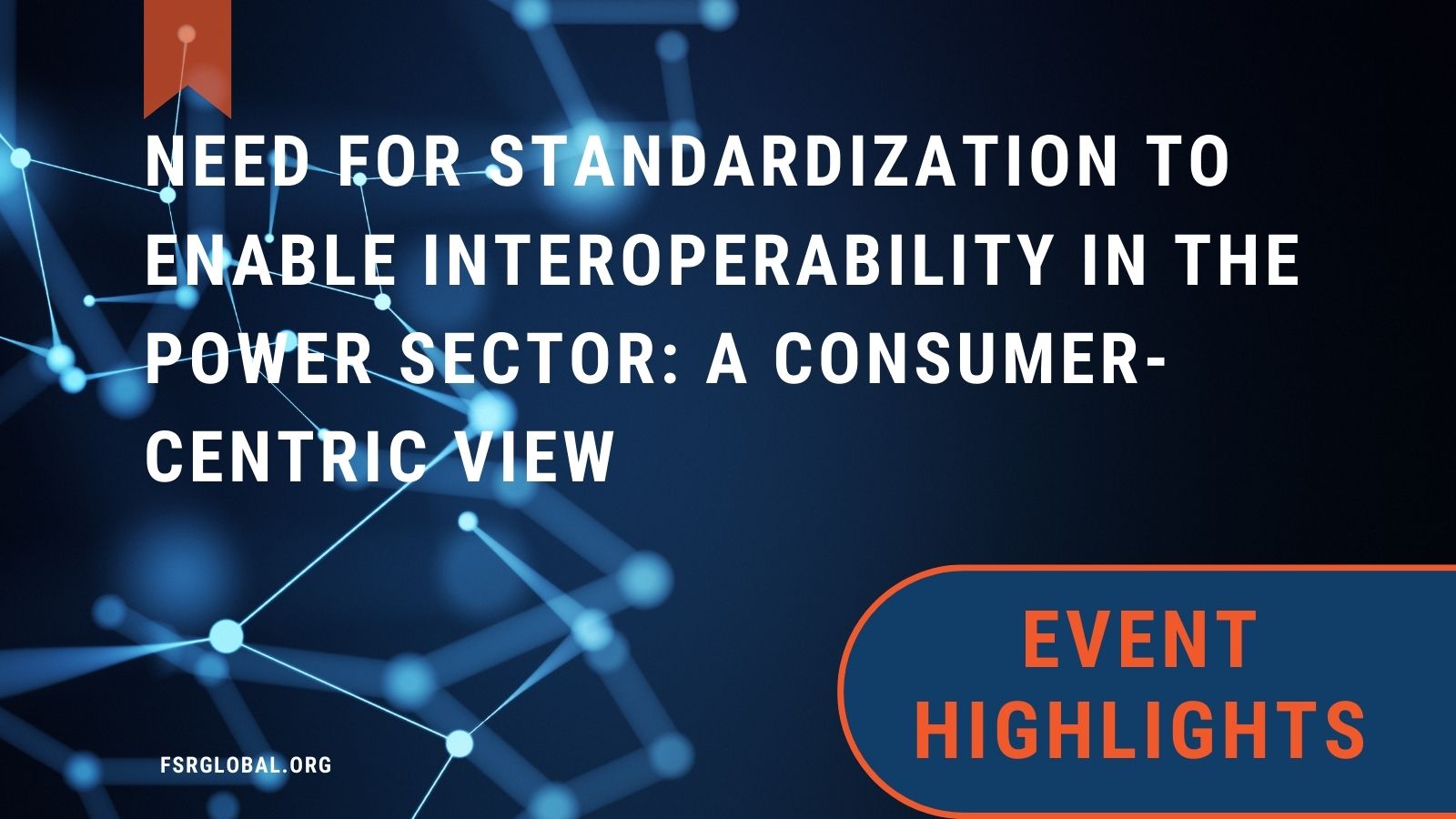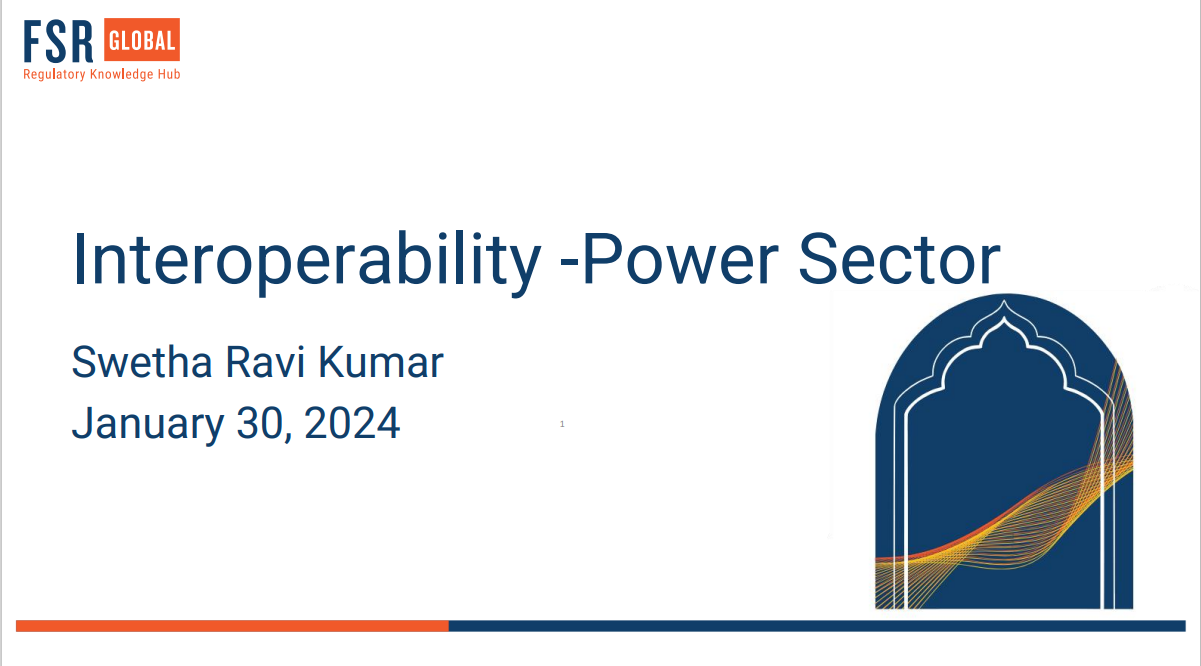Event Highlights
Need for standardization to enable interoperability in the power sector: A consumer centric view

FSR Global
EU-India Regulatory Workshop Series
Feb 06, 2024
FSR Global hosted a debate on the topic of “Interoperability” as part of the 6th EU-India Regulatory Workshop Series conducted under the EU-India Clean Energy Climate Partnership.
The speakers were Andrei Covatariu, Co-Chair, Digitalization in Energy Task Force, United Nations Economic Commission for Europe (UNECE); Laura Sandys CBE, Former Chair, UK Government’s Energy Digitalisation Taskforce; Swetha Ravi Kumar, Executive Director, FSR Global; Vimal Mahendru, Vice President and Chair of the Standardization Board, International Electrotechnical Commission (IEC); Sridhar Ponugupati, CEO and Founder, Blaze Automation and was moderated by Dr. Parul Bakshi, Research Fellow, FSR Global.
Interoperability plays a crucial role in integrating smart appliances, promoting electricity market participation, and ensuring effective planning in the market for smart appliances and related technologies. Despite the development of smart devices by multiple manufacturers, the lack of seamless communication due to varying IP (internet protocol) platforms poses a significant challenge. Standards for smart appliances are thus essential for facilitating interoperability and enabling these devices to connect, share, and interact with users and other smart devices. This requires strategic planning and coordination to ensure that these standards are implemented effectively, allowing for seamless integration and operation within the energy ecosystem
The Twin Transition
The twin transition involving both energy and digital sectors has emerged as a critical focus area for the energy industry. Emphasizing the need for a digital foundation, it highlights its role in integrating intermittent renewable energy technologies and improving system efficiency. Despite this, challenges such as limited awareness and funding pose significant obstacles to the pace of this transition. Key points include the importance of interoperability and data standards in enhancing system efficiency, the necessity of robust data governance for accurate modeling, and the potential benefits and concerns associated with interoperability and data standards.
Digitalization is seen as a cornerstone for enhancing both the efficiency and security of energy systems in today’s landscape. And the evolving nature of the power sector, transitioning from a simpler to a more complex system, underscores the need for robust interoperability. Regulators are thus urged to adapt their policies to accommodate digitalization, aligning them with evolving system objectives. Additionally, the importance of open data tools, asset visibility, customer control, consent, and market significance are seen as crucial components for a more resilient regulatory framework.
On the other hand, challenges of digitalization in the power sector, including the clash between traditional engineering and digital-native approaches, the scarcity of digital skills, and the need for a comprehensive transformation of processes are critical factors to be considered. The proactive stance of regulators like Ofgem in the UK and the International Energy Agency’s efforts to establish global standards for digitalization are some of the ongoing positive steps in addressing these challenges. Moreover, the concept of a “digital spine,” serving as the backbone for digitalization efforts in the power sector, can be seen as a key enabler for seamless integration and efficiency improvements.
The Role of Standards in Energy Transition and Digitalization
There are two definitions of interoperability: narrow, which focuses on technical system-level communication, and broad, which looks at how different organizations interact to enable an environment. Furthermore, there are different devices in an average home based on their function and interaction with the power sector. The challenge lies in ensuring that these devices are interoperable and can communicate seamlessly with each other, which can be addressed through standards.
Standards are essential for interoperability, reliability, and safety in power systems. They provide a common language for devices and systems to communicate effectively. Most standardization efforts in today’s time focus on the information layer, while the hardware and operational layers are fairly standardized. The need for protocols and standards is thus to enable creativity, innovation, and system efficiency. Standards provide a common language for different devices and systems to communicate effectively, enabling seamless integration and operation. Their importance lies in facilitating innovation, reducing costs, and ensuring compatibility across different technologies.
However, there are multiple challenges associated with developing and implementing standards especially in the power sector. These challenges include the complexity of power systems, the rapid pace of technological change, and the need to balance innovation with stability and safety. It is thus noted that standards development requires collaboration among various stakeholders, including industry players, regulators, and standards development organizations. The need of the hour is for a flexible and adaptive approach to standards development to keep pace with evolving technologies and market needs.
Matter and the Sunspec consortium are working on open standards that enable innovation and common communication standards across technologies. These efforts aim to go beyond individual devices and explore new business models in the Internet of Things (IoT) space. Open common standards give consumers more choices and insights into their device usage. It also empowers them to participate in demand response programs initiated by utilities. However, consumer awareness and data protection are crucial for regulatory support in these initiatives. Smart appliance manufacturers can focus on core product enhancements and IoT platforms by adopting open connectivity standards. This shift can lead to innovative business models such as product as a service. For the power sector, open standards provide better visibility into consumer usage, improved grid reliability, and informed decision-making for infrastructure enhancement and power procurement. Regulatory support is essential to create a level playing field for new entrants and enable cost-effective product innovation. Overall, the challenges of achieving interoperability and implementing open standards are significant but manageable.
Data Governance and Interoperability
Another key focus is data governance and its role in enabling interoperability in power systems. The importance of data governance frameworks is that they ensure the quality, security, and privacy of data used in power systems. Effective data governance is essential for enabling seamless data exchange and interoperability between different systems and devices.
Nonetheless, the challenges related to data governance in energy systems, include the fragmentation of data across different systems, the lack of standardized data formats, and the need to balance data access with privacy and security concerns. There is therefore the need for collaborative efforts among industry stakeholders, regulators, and standards development organizations to develop robust data governance frameworks that address these challenges effectively.
Funding Challenges in Energy Transition and Digitalization
Funding has been identified as a critical challenge in both energy transition and digitalization efforts. Particularly, the need for significant investment in infrastructure, technology, and workforce development to support the transition to a more digitalized and decentralized energy system. Funding for digitalization initiatives is often fragmented and lacks a systematic approach, making it challenging for organizations to access the resources they need.
A holistic approach to funding that takes into account the interconnected nature of energy transition and digitalization would be important. This approach involves identifying and prioritizing key areas for investment, leveraging public-private partnerships, and exploring innovative financing mechanisms. Policymakers and regulators will need to create a supportive environment for investment in energy transition and digitalization, including providing incentives and removing barriers to entry for new technologies and business models.
Cultural Shift and International Experiences
A prerequisite for the successful digitalization of the energy sector would be the need for a cultural shift. For example, the clash between traditional engineering approaches and digital-native perspectives, highlights the need for a cultural change that embraces digital innovation and agility. This will need to be supported by digital skills development and capacity building to support this cultural shift, ensuring that the workforce has the skills and knowledge needed to drive digital transformation in the energy sector.
Looking into international experiences and best practices in the adoption of smart grid technologies and digital standards we find examples from countries such as the UK (integrated approach and digital twin linkages), Australia (effective grid management), Ghana (leadership in standardization and energy efficiency), and the EU (work on data sharing), showcasing diverse approaches to addressing challenges related to smart grid technologies and digitalization. We must learn from these international experiences and adapt the best practices to local contexts to drive progress in the energy sector.
Conclusion: Policy-Driven Transformation
In conclusion, there is a need for a policy-driven transformation in the energy sector, emphasizing the importance of supporting consumers’ active engagement through standards and interoperability. While automation can liberate consumers from becoming energy experts, a lack of digital advancements in the energy sector could lead to frustration among consumers. It must be kept in mind that the cost of not having standards would far exceed the cost of implementing them. Participation is also crucial for achieving great standards and successful implementation, and there is also a need for investment in infrastructure to pave the way for future interoperability. Thus, for future action, we must look into a holistic approach that addresses the complex interplay of technical, regulatory, and financial factors in the energy sector’s transformation.
Publication
If this topic is of interest to you, you may like to read our Policy Brief “Interoperability and open standards for home connected devices: Unlocking benefits for the power sector”
Presentations



